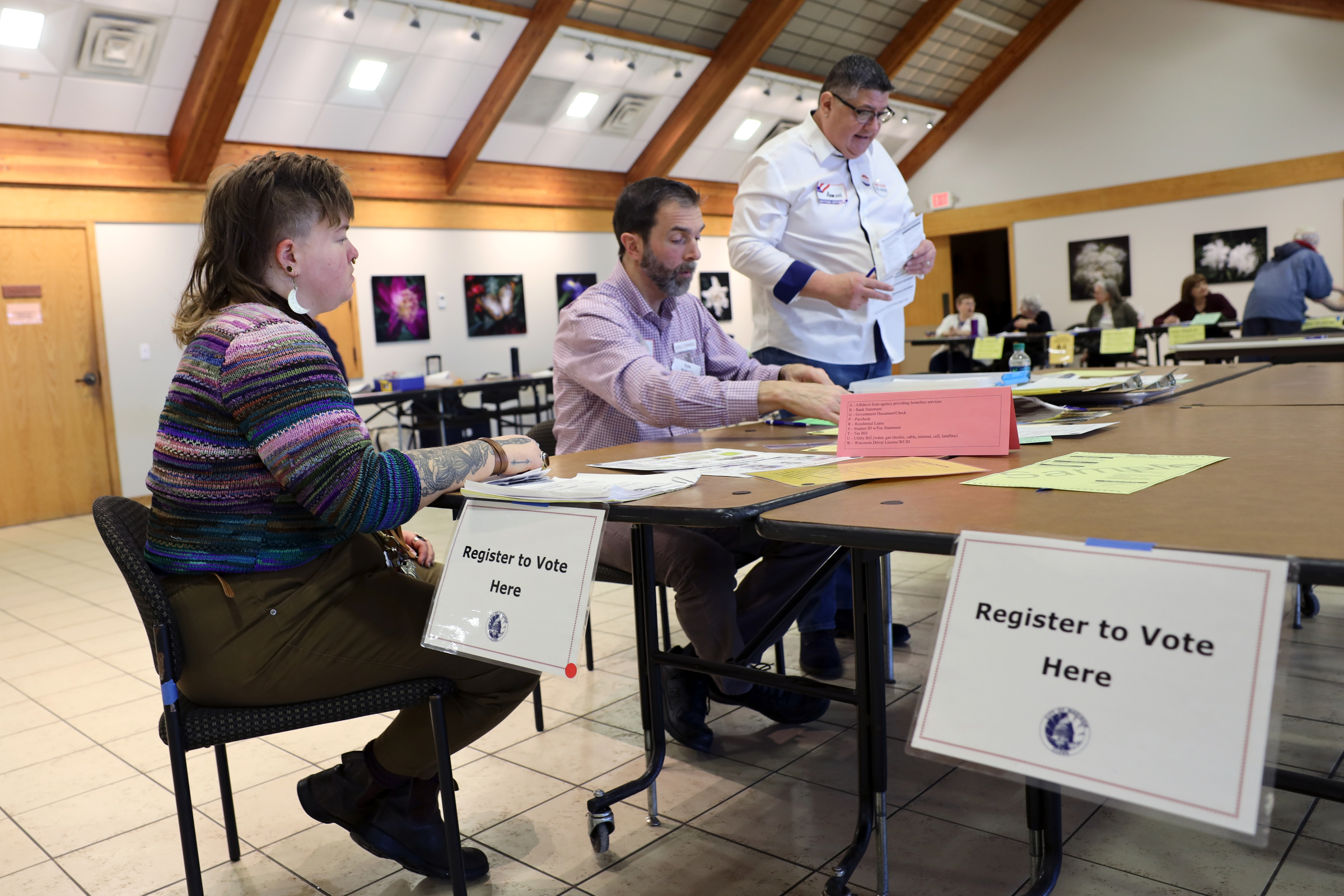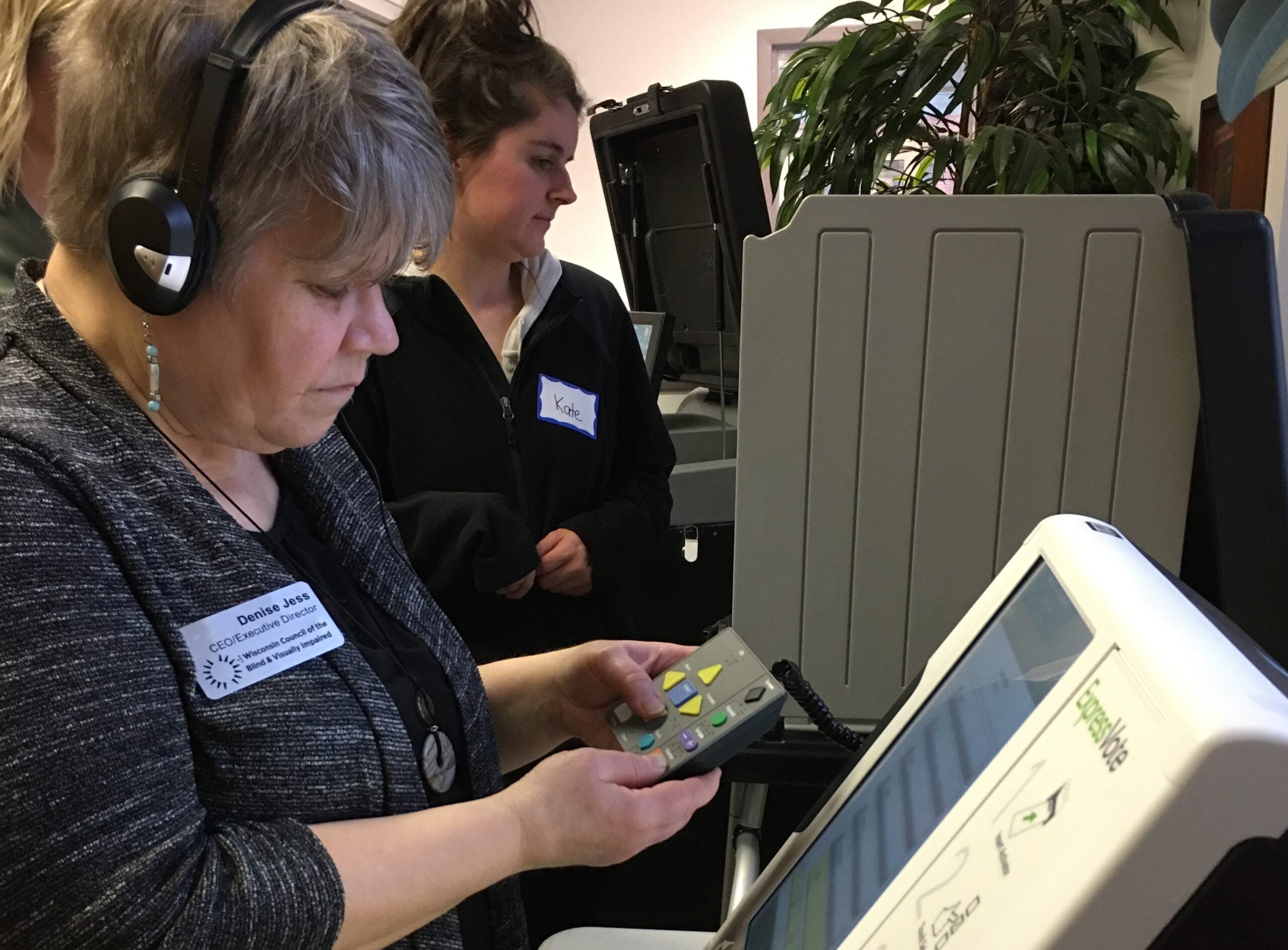The U.S Department of Justice’s Civil Rights Division will post election monitors in four Wisconsin locations Nov. 5. The news comes as Wisconsin’s top elections administrator says local clerks have been preparing for any potential election day problems since 2020.
The DOJ announced Friday it will “monitor compliance with federal voting rights laws” in the cities of Milwaukee, Wausau and the Rusk County Towns of Lawrence and Thornapple during Tuesday’s presidential election.
The DOJ sued the Towns of Lawrence and Thornapple in September, accusing local officials of breaking federal law for not making at least one accessible voting machine available to voters with disabilities during elections in April and May. The Town of Thornapple is currently appealing a preliminary injunction requiring it to bring the accessible voting machine back for the upcoming election.
News with a little more humanity
WPR’s “Wisconsin Today” newsletter keeps you connected to the state you love without feeling overwhelmed. No paywall. No agenda. No corporate filter.
In Wausau, the Wisconsin Department of Justice has taken over an investigation into whether the city’s mayor broke the law by removing a ballot drop box outside city hall Sept. 22.
Wisconsin’s top elections official says clerks have prepped for potential election day problems since 2020
Also on Friday, Wisconsin Elections Commission Administrator Meagan Wolfe said early, in-person absentee voting remains stronger than expected with more 801,000 ballots cast thus far. That represents around a 48 percent increase in early, in-person turnout compared to the same time in 2020.
Wolfe also said slowdowns with the WEC’s computer system that caused delays for clerks trying to print absentee ballot labels have been resolved.
“Also, importantly, the label printing function is not a function that is used on election day. It is only an optional function that’s used during in-person, absentee voting,” Wolfe told reporters at a media briefing.
When asked whether Wisconsin clerks had reported any issues seen in other states, like absentee ballot drop boxes being set on fire or disruptions at early voting sites, Wolfe said they have not.
Wolfe said clerks have been preparing for the upcoming election since 2020. That’s when former President Donald Trump began falsely claiming his loss to President Joe Biden was due to voter fraud, driving up public concerns about election integrity.
“We always hope that a bad day in elections never happens, but if something should occur, I think our local election officials have truly been preparing for those possibilities for the last four years,” Wolfe said. “And they take it very seriously that they want to ensure that their voters can feel safe and secure when they go to vote using whatever method they choose.”
Wisconsin Elections Commission spars over guidance spawned GOP allegations of noncitizens voting
The elections commission held a meeting after Wolfe’s briefing. Things grew heated between some of the six voting members of the commission during a discussion on clerk guidance tied to Republicans’ recent focus on the potential of noncitizens voting in the presidential election.
While research has found that illegal voting by noncitizens is exceedingly rare, documents prepared by commission staff said they’ve received “many questions from clerks.”
The guidance notes that the state Legislature, which is controlled by Republicans, changed state law in 2016 to allow “Limited Term” and “Non-Domiciled” drivers licenses and ID cards to be used to vote in Wisconsin. Those cards are issued to people who were legal residents but not yet citizens when they applied for the credentials.
The guidance states that clerks or elections inspectors who are notified a person presented a “Limited Term” or “Non-Domiciled” card at a polling place should challenge their eligibility to vote unless they provide citizenship documentation. During a challenge, the prospective voter is placed under oath and asked if they are U.S. Citizen. The the answer is no, a ballot cannot be issued.
Republican Commissioner Bob Spindell, who posed as a false elector during Trump’s 2020 attempts to overturn his loss to Biden, claimed he’s heard that some noncitizen driver’s licenses don’t include the phrase “Limited Term” or “Non-Domiciled.”
He contended that if birth dates and expiration dates on drivers licenses do not match, it could be an indication that the holder is not a citizen. And he asked whether birth dates and expiration dates on licenses could be matched in order to tell if a person was a citizen or not.
“So I was wondering if the (WEC) staff has any more information on that, because this is a question that has been put forth,” Spindell said. “It’s my understanding the Republican Party of Wisconsin has instructed the paid poll workers and also the observers that this is something that needs to be looked at and could possibly be a reason for challenge.”
Democratic Wisconsin Elections Commission Chair Ann Jacobs scoffed at Spindell’s statement and question.
“Are you saying that you’re asking this commission to order poll workers across the state to examine every single driver’s license?” Jacobs said. “That’s the millions of voters who are going to vote on election day that they’re supposed to be analyzing these expiration dates, because you’re telling us it’s possible that one of those identifications could be someone who might not be a citizen?”
Spindell backtracked slightly but said if a poll worker notices inconsistencies there should be commission guidance. “Because I hate to see a whole bunch of challenges.”
Wisconsin Elections Commission Chief Legal Counsel Jim Witecha told members that DOT attorneys told him the only time the situation is referring to would happen is on the “Limited Term” and “Non-Domiciled” cards.
Democratic Commissioner Mark Thomsen called Spindell’s claims “outrageous.”
“We used this law in 2016 when Donald Trump won, and we used it in every election since, and this hasn’t been an issue,” Thomsen said. “We just heard it’s a non issue. We should not put out anything publicly to any poll worker that what they’ve been doing for years is wrong or that it should be challenged, and especially a few days before the election.”
The GOP focus on alleged non-citizen voting has led to two referendum questions that will appear on ballots Tuesday.
Wisconsin Public Radio, © Copyright 2025, Board of Regents of the University of Wisconsin System and Wisconsin Educational Communications Board.





